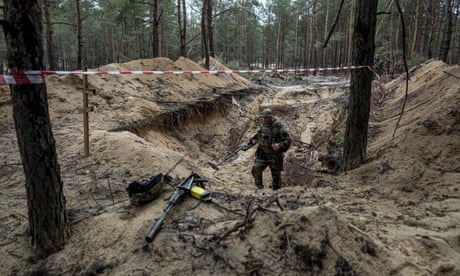Attitude wins wars. JL
Dan Sabbagh reports in The Guardian:
On one side is an army – Ukraine’s – that considers itself to be fighting for the cause of national liberation. Ukraine increasingly believes it will one day win the war, helped by western intelligence, financing, artillery and other fresh munitions. Set against them are the Russian invaders, a mixture of elite soldiers, recent recruits, and conscripted separatists who are often reluctant to fight outside Donetsk and Luhansk. Many are exhausted having fought without rotation, for six-plus months. “The Russians have poor morale, poor camaraderie, a lack of confidence in their command."The Ukrainian video begins with the Dunkirk beach scene from the film Atonement, the soldiers’ stirring rendition of Dear Lord and Father of Mankind. Until it transitions to several hundred Ukrainian troops, singing the country’s national anthem in the open air, ahead of last week’s successful Kharkiv offensive.
Life may be trying to imitate art, but in this case there is no clearer demonstration of Ukrainian national morale as the war heads towards the end of its seventh month. The unprovoked attack by their larger neighbour has unleashed a patriotic mobilisation that is having a transformational effect on the battlefield.
There is a stark contrast with the Russian defenders. Faced with a lightning Ukrainian attack that cut off the strategic city of Izium a week ago, some departed in haste, abandoning tanks and other munitions and engaging in looting generators, telephones, and computers they nominally withdrew from the frontline.
“Morale,” says Jack Watling, a land warfare expert at the Royal United Services Institute military thinktank, “is the most important factor for ground forces”.
“It is not just about how soldiers feel about their prospects relative to the enemy, it’s also about the experiences they have recently had and how they are anticipating into the future.”
On one side is an army – Ukraine’s – that considers itself to be fighting for the cause of national liberation. Having beaten off the Russians from Kyiv and pushed them back in Kharkiv, Ukraine increasingly believes it will one day win the war, helped by western intelligence, financing and above all artillery and other fresh munitions.
Morale cannot be detached from the wider military and political context, but it is also an important component to both. Reports from visiting wounded Ukrainian soldiers frequently emphasise that many want, if at all possible, to return to the frontline, and say that the fight against Russia is necessary, despite what has happened to them.
Set against them are the Russian invaders, a mixture of elite soldiers, recent recruits, and lightly armed and sometimes conscripted separatists who are often reluctant to fight outside their home provinces of Donetsk and Luhansk, many of whom are exhausted having fought constantly, without rotation, for six-plus months.
While Ukraine has quietly trained large numbers of troops from its initial mobilisation, and replenished them with western-supplied weapons, Russia has done so far less and, the US says, is now buying weapons from North Korea. Winter is coming and how well each side is prepared will be critical.
“The Russians have poor morale, poor camaraderie, a lack of confidence in their command from the beginning. Most soldiers were not told a war was starting and many things they were told about Ukrainians were wrong,” Watling said. Since then there have been repeated examples of a reluctance by some Russian soldiers to fight, and difficulties Moscow is facing recruiting.
Russia would not be the first great power to be humbled by a smaller but more determined opponent in recent history. The Taliban ultimately regained power in Afghanistan last year because the US no longer had the appetite to fight a long, grinding war against an opponent not ready to concede. War can come down to which side is willing to sustain the most casualties, if a quick victory cannot be obtained.
Even Ukraine and its western supporters, though, have at times been surprised by the national determination to fight. As the war began, US officials feared that Kyiv could fall within days; at the very least western officials expected the city to be encircled. Senior Ukrainians in government have reported their surprise at how diligently orders were carried out, with one telling the Washington Post that since the invasion officials had “worked more efficiently than ever”.
Ideology, religion and nationalism all help win wars but a sense of justice is important too. Fresh reports that more than 440 bodies have been found at a single burial site near Izium are likely to be the beginning of grim revelations about the reality of Russian occupation – and will in turn act as a motivator for troops and others in Ukraine. Already visitors to Ukraine are often given a tour by politicians of the mass burial site in Bucha, north-west of Kyiv, to try to win them to the defenders’ cause.
Contrast that, again, with the Russian side. This week a video emerged of mercenary boss Yevgeny Prigozhin addressing a large group of prisoners, telling them “if you serve six months” in his Wagner group “you are free”, saying the war in Ukraine was “a hard war, not even close to the likes of Chechnya” and that their help was needed. While some Ukrainian soldiers are being trained in places like the UK, new recruits on the Russian side come from jail.
Such a contrast between motivated and mercenary is likely to accentuate into next year and will play a critical factor as the war runs on, assuming western support for Ukraine continues. “I believe we are now on a trajectory for a Russian defeat in Ukraine next year,” Watling said.





















1 comments:
Your blog has garnered considerable genuine interest. I can see why, as you effectively generated interest in your content.
Post a Comment